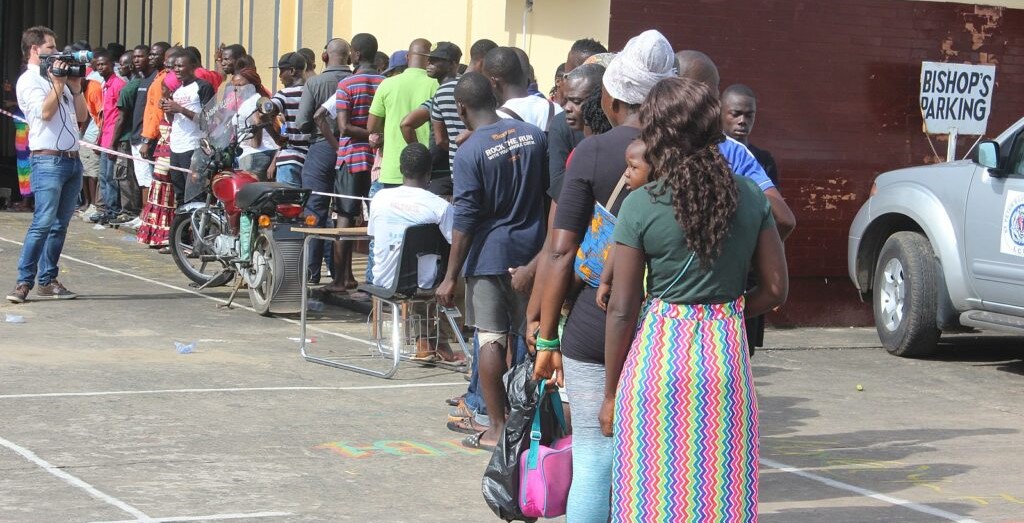Liberia, a fragile democracy that has gone through harsh political turmoil for decades, has demonstrated that democracy can still survive in the West African region which is synonymous with military coups, aging leaders clinging to power, and rigged elections. The recent Presidential election in Liberia is hailed as a significant milestone proving that leadership change is possible through peaceful means.
Liberia President George Weah gracefully conceded election defeat to opposition leader Joseph Boakai. Weah showed how a leader can rise above party and personal interest ensuring a smooth transition of power. Mr. Boakai, the 78-year-old former vice president of 12 years defeated Mr. Weah, a 57-year-old former soccer legend, by a razor-thin margin. He won 50.9% of the vote over Weah’s 49.1%. For the first time since the early 1900s, an incumbent president of Liberia failed to be re-elected after serving one term.
Mr Weah, the first African footballer to win both FIFA’s World Player of the Year trophy and the Ballon d’Or – had aroused high hopes for change in Liberia when he won the Presidential election in 2017. The country was still recouping from civil wars and the Ebola epidemic and badly needed a visionary leader. However, he failed to rise to the expectations of the people. The six years of Weah’s Presidency were blemished with graft allegations.
Liberian elections in 2023 manifested the evolving political landscape of the country as well as the democratic aspirations of its people for inclusive governance. Candidates from diverse fields and ideologies offered a spectrum of choices for the electorate. The election campaign centred around key issues like social welfare, education reform, and healthcare accessibility.
The election itself was conducted amidst several challenges yet was largely peaceful and applauded by international observers. Above all, the 2023 election, unlike the previous elections, was solely managed by Liberian authorities without international funding or assistance. The National Democratic Institute’s election observation mission in Liberia noted active voter-education campaigns, diversity of candidate profiles, and better transparency that allowed citizens to observe the electoral process. Political analysts also acknowledge the role of former President Ellen Johnson Sirleaf in nurturing the culture of democracy in Liberia. Afrobarometer, a pan-African research network credited former President Ellen Johnson Sirleaf’s 12-year rule for strengthening the necessary institutions to build a culture of democracy in Liberia.
Joseph Boakai, the President-Elect faces stiff challenges ahead. He has ignited the hope and optimism of the Liberians to usher in a new era of stability, economic growth, and social development. Apart from navigating the economic, social, and political challenges, the new Government must crack down on corruption and drug menace and also ensure that the nation’s democratic journey continues. The onus of translating the rhetoric to tangible results by strengthening institutions, transparency, and the rule of law rests squarely on him and his team.
Though the electoral outcome has generated a positive mood, the daunting challenges faced by the country cannot be ignored. The World Bank last week temporarily halted disbursing Loans and specific Trust Fund grants to Liberia. The country had defaulted loan repayments to the World Bank by 60 days under the administration of outgoing president George Weah. According to the World Bank, though Liberia’s economy grew by 4.8% in 2022, its fiscal position worsened with its deficit estimated to have risen to 5.6% of GDP in 2022, against 2.4% in 2021.
While challenges persist, the 2023 election is a testimony to the resilience and determination of the Liberian people to uphold democracy. Over the past seven decades, Liberia has progressed slowly but steadily in its journey to democracy. The landmark elections in 2017 for the first time in 73 years marked a new beginning. The 2023 election is another milestone, with an incumbent president adhering to term limits and allowing a smooth transfer of political power.
Hard as it may seem, other African countries must introspect and learn from this election to undo the political mess they have been steeped in. Several presidential elections in the region are scheduled in 2024, including polls in Senegal, Ghana, and Mauritania, as well as military-ruled Mali and Burkina Faso. The legitimate question is, how far can other African nations emulate the Liberian model?





